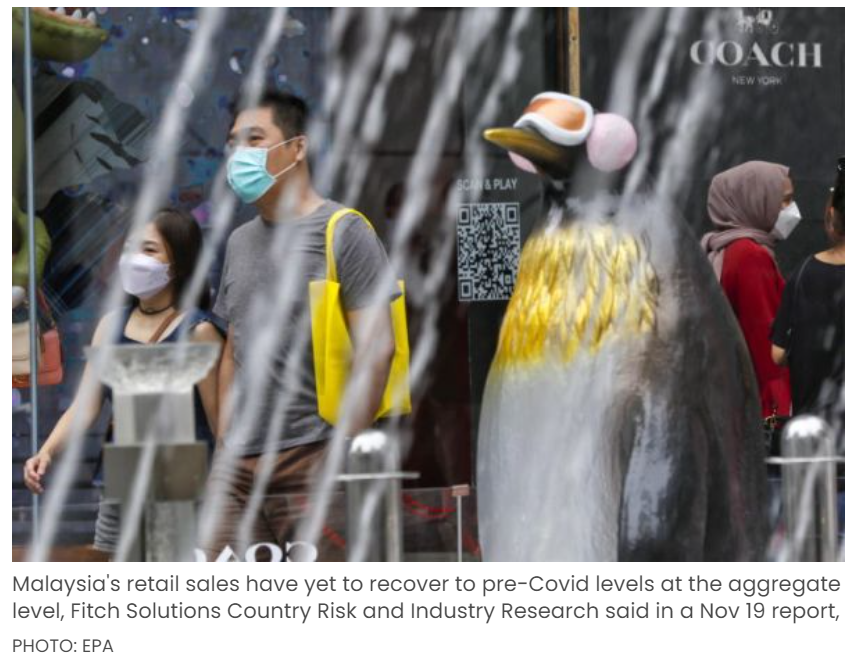Malaysia’s retail sales still below pre-Covid levels, but ‘formalised’ sector gained: Fitch Solutions
MALAYSIA’S retail sales have yet to recover to pre-Covid levels at the aggregate level, though categories such as food and consumer electronics have outperformed, Fitch Solutions Country Risk and Industry Research said in a Nov 19 report, while also noting “evidence that Covid-19 has accelerated the formalisation of the retail market in Malaysia”.
In the first 9 months of 2021, retail sales grew 4.3 per cent year on year. But this is overstated due to a low base effect, with retail sales having contracted 5.3 per cent in the year-ago period.
Retail sales in the first 3 quarters of 2021 were still down 1.2 per cent from the corresponding period in 2019.
The series of Covid-related lockdowns and movement restrictions implemented since March 2020 “has had both an economic and a psychological impact on Malaysian consumers, affecting the way they spend their disposable income”, said the report. All figures in the report refer to the first 3 quarters of each year.
With consumers focusing on essentials amid the pandemic, the food, drink and tobacco category has been one the best performing sales categories in Malaysia during this period.
The Malaysian Department Of Statistics distinguishes between speciality stores for food, drink and tobacco, and non-speciality stores: provision stores, department stores and supermarkets, hypermarkets, mini-markets and convenience stores.
The specialised stores are predominantly informal, while non-specialised ones are more formalised, said Fitch Solutions.
Most of the non-specialised formats were allowed to operate even during the strictest Covid-19 curbs. In the first 3 quarters of 2020, sales through such stalls were up 1.8 per cent year on year. Though this slowed to 0.6 per cent in 2021, sales levels were still 2.4 per cent higher than the pre-Covid 2019 period.
Non-specialised stores have also increased their share of total retail sales amid the pandemic. In 2019, they accounted for 38 per cent of total retail sales. This rose to 41 per cent in 2020, then moderated to 40 per cent in 2021, though Fitch Solutions still sees this as “suggesting that consumer spending is shifting towards this avenue”.
For specialised food, drink and tobacco stores, sales in the first 3 quarters of 2021 were up 4.1 per cent year on year, and 9.5 per cent higher than the pre-Covid 2019 period.
Another outperforming category is consumer electronics, with Fitch Solutions seeing this as “largely as a result of consumers adapting to the new reality of Covid-19 restrictions”.
In 2020, sales of such items took a hit, down 7.5 per cent year on year. “However, as consumers adjusted to spending more time at home, items in this consumer category were key to entertainment spending,” said the report.
Sales rebounded in 2021, up 9.5 per cent year on year, and 1.3 per cent higher than in 2019.
In contrast, non-digital forms of entertainment fared poorly. Cultural and recreational goods were one of the worst performing categories, with sales down 14.3 per cent in 2020.
Though this category saw 8.9 per cent growth in 2021, its sales remain 6.7 per cent lower than in 2019.
The category includes both big-ticket items such as fishing equipment, camping goods, boats and bicycles; and smaller items such as office supplies, books, newspapers, stationery and musical records.
During the strictest Covid-19 measures, many such shops were not permitted to open. “Additionally, the impact that Covid-19 had on disposable incomes in the country has meant that consumers cut back significantly on big-ticket items,” said Fitch Solutions.
“While we still hold the view that there was an increase in sales of smaller cultural and recreational items, it was not enough to offset the drop in sales on big-ticket items.”
Sales of household goods performed poorly too, down 11.6 per cent in 2020 as physical stores selling such items were also unable to open under the strictest restrictions.
Sales picked up 9.5 per cent in 2021 but were still down 3.7 per cent compared to 2019.
Source: https://www.businesstimes.com.sg/asean-business/malaysias-retail-sales-still-below-pre-covid-levels-but-formalised-sector-gained


 Thailand
Thailand




